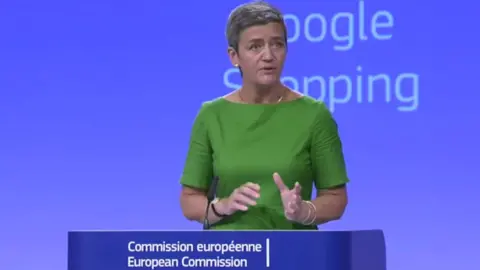Tech Tent: Europe moves to fine big US tech firms
 BBC
BBC- Stream or download the latest Tech Tent podcast
- Listen to previous episodes on the BBC website
- Listen live every Friday at 15:00 GMT on the BBC World Service
It's been a week which has seen another huge cyber-attack with worrying implications, a record fine imposed on Google by the European Commission - and a law passed in Germany to punish web firms who fail to remove extremist content.
On Tech Tent this week we reflect on the growing tensions between Europe and the United States over the regulation of tech giants - and mounting global anxiety over cyber-crime.
 EPA
EPARansomware Returns….
...or does it? When news broke this week that a new cyber-attack was under way, affecting businesses and government organisations around the world, it sounded very similar to the Wannacry ransomware which afflicted NHS hospitals in May.
But it is becoming clear that this was rather different. For one thing, the attack seems to have been focused on Ukrainian businesses and state organisations, and has spread rapidly within networks but not hopped from one to another so easily.
Experts are also pointing to the fact that the attacks seemed to destroy data rather than just locking it up - which means that it is unlikely to garner many ransom payments as victims will get nothing in return for paying up.
The show debated what conclusions we can draw about who was behind the attack - and whether it is more or less worrying than Wannacry.
 European Commission
European CommissionGoogle v Europe
Type anything you might buy into Google's search engine - say, leather shoes - and at the top of the results you will see a box with images of products and links to where you can order them. This is an advertising service called Google Shopping, and this week the European Commission decided it amounted to an abuse of the search giant's market power.
The European Commission slapped a record 2.4bn euro ($2.7bn; £2.1bn) fine on Google and ordered the company to change its ways and stop favouring its own services above rival shopping comparison services.
Depending on your point of view, this was either a long overdue move to trim the sails of an over powerful monopoly - or it was Europe throwing a hissy fit because it can't produce a company as innovative as Google.
The second view is expressed forcefully on our programme by the media academic Prof Jeff Jarvis, long an admirer of Google. He says there is little evidence of harm to consumers from Google's behaviour and sees this week's fine as sour grapes:
"I think Europe has constantly been in the position of feeling jealous that it doesn't have a Google," he tells us. "But you're not going to get there by regulating and passing protectionist legislation."
Of course the irony is that the EU ruling has been applauded by the likes of Rupert Murdoch's News Corp and the British tabloid press, usually sceptical about regulation and anything else that comes out of Brussels.
But in the view of Prof Jarvis that is because they have watched impotently as the innovative web giant steals their advertising business - so they have decided that their enemy's enemy is their friend.
 Getty Images
Getty ImagesGermany moves against online hate
Another area where Europe and the United States see things differently is on where to draw the line between free expression and protecting people from racist and violent language.
The German parliament has just voted to approve a law which could see social media firms face big fines if they fail to remove illegal hate speech within 24 hours. A country where there are strict laws against anti-Semitic and other racial abuse has struggled to apply those rules online.
Now, according to Justice Minister Heiko Maas, Germany has acted to end "the internet law of the jungle".
The American social media giants had lobbied long and hard against what looks like the strictest law yet to be applied about online behaviour in a democratic country
And even some German organisations which monitor online hate speech and fake news are worried. Alexander Rabe from Eco, which was consulted about the drafting of the law, told us that it was difficult to define hate speech and he was concerned that repressive regimes might take inspiration for a crackdown on free expression..
So why did lawmakers vote it through?
Our correspondent in Germany, Joe Miller, tells us there is a simple answer - the idea of curbing hate speech and taking on what are seen as irresponsible American web firms is hugely popular.
